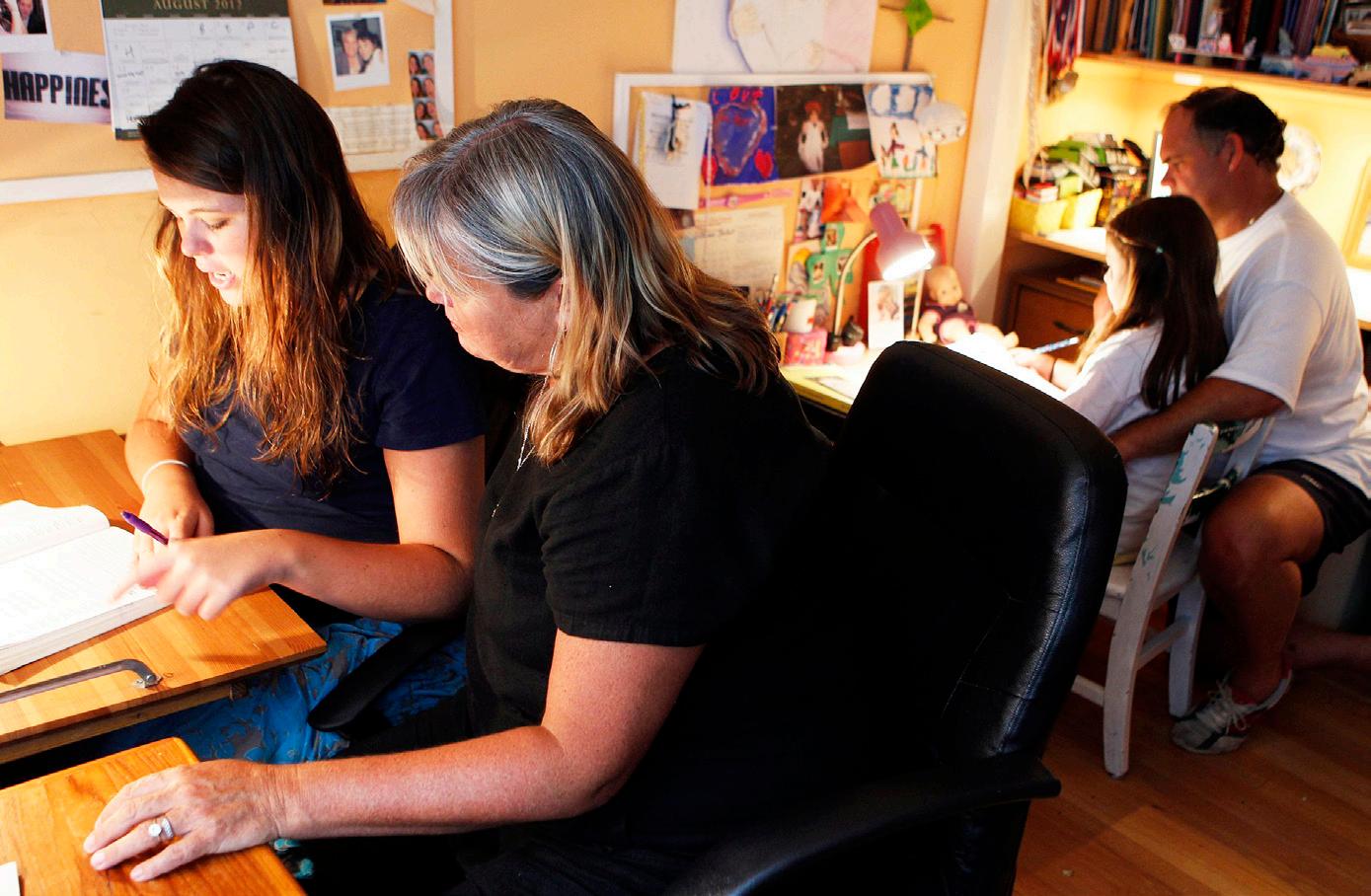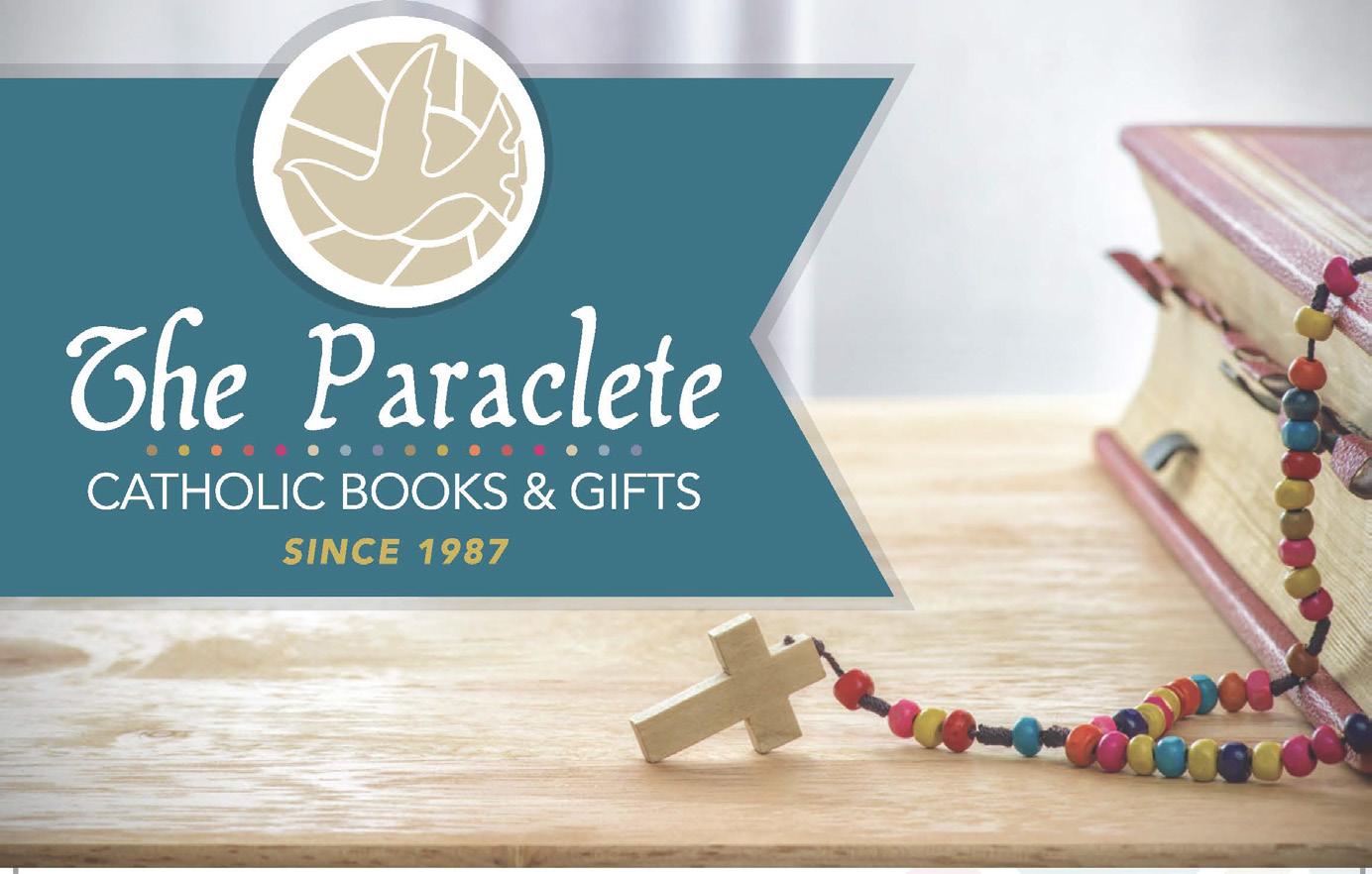
6 minute read
Feeling more mainstream
Catholic homeschool experts say learning at home is becoming
By Maria Wiering OSV News
Valerie Faverio had been “enamored” with the idea of homeschooling since she was pregnant with her now 9-year-old daughter, but it was the pandemic that pushed her to try it herself.
At the beginning of 2020, Mrs. Faverio’s children were attending a Catholic school 40 minutes from their home in New York’s Hudson Valley. When the COVID-19 pandemic forced brick-and-mortar schools across the United States to shift to distance learning in March 2020, the Faverios, like parents nationwide, got a taste of homebased education.
They also were among Catholic parents that decided to stick with it. Tuition, uniform costs, and “endless fundraisers” were a struggle, and they were weary from early rising and piles of homework that, Mrs. Faverio, 37, said, left “barely time for any extra activities or family time” with their three kids.
“We were burnt out and miserable,” Mrs. Faverio said.
While her children returned to their school in the fall of 2020, by spring 2021 Mrs. Faverio had decided to teach them at home, beginning the next academic year.
According to the National Home Education Research Institute, the number of U.S. homeschool students in grades kindergarten to 12 grew from 2.5 million in spring 2019 to 3.1 million, or roughly 6 percent of school-age children, in the 2021-22 school year.
“The homeschool population had been growing at an estimated 2 percent to 8 percent per annum over the past several years, but it grew drastically from 2019-20 to 2020-21,” the NHERI’s website states.
Research from Stanford and the Associated Press suggests homeschooling enrollment increased
Deacon continued from page A16 projects in countries as diverse as Russia, China, Argentina, Morocco, Kenya, Japan, Egypt, Romania, and many other nations that didn’t always see eye-to-eye with the politics and goals of the United States.
“I have gone where people have very strong anti-American feelings, and we try to win them over, not by giving them money but by showing them that this is why we do what we do. I told people all the time, I am here because I love my family, but I love your family, too, and I know that you do, too. So, we must work together to protect our families. I can’t tell you how many times I have repeated that phrase because I honestly believe that. That’s what we are doing in the Church ”
That diplomacy will help him serve a mission diocese with 51 diverse parishes, 10 accomplished schools, and countless active ministries. In doing so, his diplomatic skills will be called upon again.
“My job right now, as I see it, is building trust. I can’t do strategic planning if I don’t have the trust of the people I work with. That is my goal. We need to figure out how to bridge what we do here in support of the parishes.
“I do have a role in the school office. Not with the schools per se, except for when it comes to looking at development and how we can help sustain the schools. At the end of the day, people say my title is school sustainability. School sustainability is money. How do we make the case that this is a valuable investment for our Church and the families of our Church? If we are going to be successful, we need to figure out how to fund them.
“The simple answer is we need
30 percent in the United States between 2019 and 2022, and some states are passing laws that allow homeschooling families to use public funds to cover education costs.
Seton Home Study School, an accredited school for home learning and the largest provider of Catholic homeschooling materials in the United States, saw a large enrollment boost during the pandemic, said Draper Warren, Seton’s admissions director. The Virginia-based company’s enrollment jumped from about 12,000 students in 2019 to 20,000 in 2020. As traditional schools returned to in-person learning, Seton's enrollment dropped in 2021 to 17,000. In 2022, enrollment fell slightly again to 15,500, and Mr. Warren expects similar numbers for this fall.
The roughly 3,500-student increase from 2019 to now exceeded pre-pandemic projections, Mr. Warren said. “For the decade before COVID, we weren’t seeing a ton of growth; we were basically just staying about the same,” he said.
Homeschooling can mean a ma - more money, but the complex answer is we’ve got to do business differently. I think we do a pretty good job, but we must continue conveying the value proposition for a Catholic education for both Catholics and non-Catholics so that we can keep our enrollment numbers where they need to be. I am going to focus on how do we communicate the Catholic school message? How do we raise money? And then, what else do we need?”
The diocese has experienced an impressive level of growth since its establishment in 1988. By a large margin, there are more registered Catholics, more parishes, more ministries, and more religious communities that have enriched the diocese beyond expectations. But sustaining that growth, especially for Catholic schools, isn’t guaranteed in any diocese—big or small. Although he’s been retired from the military for 10 years, Deacon Duhamel compares his current job with the task he faced in the Marines.
“The Marine Corps, being the smallest service, has always been the most underfunded. We didn’t have a lot of money in the 1990s. We were not as flush as we are now. That faucet, if you will, didn’t turn on for the Marine Corps until about 2000. That is what formed me as a young infantry officer growing up. You still achieve your mission with whatever resources you have. And part of that is making sure your (team) feels a part of the problem-solving, that they are fully engaged, but they’re always taken care of. I think that is directly relatable to our Church here. We have a mission. We have finite resources. Are we doing things the best we can? And most people will always say jor lifestyle change for a family, which can feel scary, he said. He suspects many parents who have switched to homeschooling were already thinking about it before the pandemic.
“Parents don’t understand what it will look like if they start homeschooling, and so sometimes it’s just easier to keep doing what they’ve been doing,” Mr. Warren said. “COVID just kind of shook people out of their complacency.”
While there is no national data specifically tracking the number of Catholics who homeschool, Catholic homeschooling experts who spoke to OSV News all reported an increase in interest in their homeschooling programs or resources in the past three years.
“The Catholic trends follow the wider trends,” said Jenny Bales, a Texan who supports fellow Catholic homeschooling parents through her website, Heart of a Mother.

“One of the things we did see, even before COVID (was) obviously a continual rise in home schooling, overall, and among Catholics specifically, because there’s increasingly struggles to there is room for improvement,” he pointed out.
Deacon Duhamel was ordained to the permanent diaconate in 2022 and balances his busy schedule as a father of seven children with his wife and his ministerial duties at St. Mary.
He’s been on the job at the diocese for just a few months, has visited some parishes and schools, plans to visit more, and said he will reach out to school leaders. He said the diocese is help our children not be exposed to messages that are contrary to our faith,” Ms. Bales said.
She said some Catholics choose to homeschool because they don’t have access to Catholic schools or feel they can’t afford them, or because Catholic schools didn’t provide special services they needed. As the pandemic waned, Ms. Bales noted a rise in families choosing to homeschool to benefit a child with a learning disability or neurodiversity diagnosis such as ADHD, who do better with one-on-one instruction. Some families also choose homeschooling for peak athletes to accommodate training or competitions, or because of health reasons, Mr. Warren said.
“It’s been interesting to see that not all Catholic homeschoolers are homeschooling for faith-based reasons," Ms. Bales said. “I think probably still the majority are, but there’s … a great number of homeschooling families who come to it for different reasons: to customize curriculum, to help their different children with challenges thrive … and seeing families where homeschooling has actually opened for them an opportunity to rediscover their Catholic faith.”
Meanwhile, in recent years, the variety of online resources and communities for homeschoolers has exploded; museums and learning centers offer more weekday programming geared for homeschoolers, and in many places homeschooling family meet-ups abound.
Ms. Bales, a former teacher, has homeschooled all four of her children from kindergarten on, with the oldest two now at universities. While homeschooling has gained popularity in recent decades, Ms. Bales said it still felt “fringe” and out-of-sight before the pandemic pushed it into the mainstream. In many places, that has also meant that Catholic homeschooling families and groups are becom -
Homeschool continued on page A23 facing many other important issues including the growth of the Hispanic community, which now outnumbers the Anglo community in at least one large parish in the diocese.
Developing and training leaders in those communities, placing schools on a sustainable financial path, and drawing up a longrange strategic plan that serves the diocese and its parishes well into the future isn’t such a small task. ■











